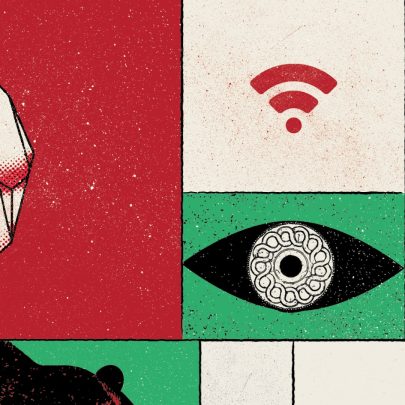Aug 17, 2015 People
This story by Morgan Godfery first appeared in the June 2015 issue. Photograph by Jane Ussher. Leading members of Ngati Whatua Orakei. Seated, from left: Marae Manager Matt Maihi; Kaumatua Wirihana (Bob) Hawke; Trustee Pakihana (Grant) Hawke. Standing: Marae Coordinators Natalia Makoare and Monique Pihema; Trust Administrator Sharon Aroha Hawke; Trust Deputy Chair and Whai Rawa Director Ngarimu Blair.
If you want to wield influence in Auckland, it helps to have an iwi behind you. If you want to wield enormous influence in Auckland, try and unite 12 iwi behind you. Paul Majurey — the chair of the Hauraki Collective, the Tamaki Collective and the most influential Maori person in Auckland — did just that. From the Maunga Authority to Resource Management Act hearings, where there is an important public decision to be made the chances are Paul Majurey is helping to make it.
Nipping at his heels is rising star Ngarimu Blair. He’s deputy chair of Ngati Whatua Orakei Trust, a director of Waterfront Auckland and the heart behind major projects like the ecological restoration of Bastion Point. On a typical day Blair helps decide whether to close a popular beach for a tribal event or ban vehicles from driving up Mount Eden.
Blair and Majurey belong to the new group of iwi leaders who exercise enormous public and bureaucratic power. Trade unionists and political activists would have dominated this list in the 20th century; now, influence has shifted from the picket line to business boardrooms, council committees and statutory boards. The last Maori unionist of significant influence in Auckland is Syd Keepa, president of First Union and a vice-president of the Council of Trade Unions.
This shift in influence has happened across generations and within generations. David Taipari, the chair of the Independent Maori Statutory Board and once a union delegate, now heads an organisation which is, ironically, more powerful than two Maori seats on the Auckland Council ever could have been. The board has a formidable bureaucratic infrastructure, led by fierce operators such as CEO Brandi Hudson, and enjoys voting rights on most council committees.
Majurey, Blair and Taipari all enjoy mana whenua connections to Auckland. Others come from outside. Tupara Morrison, who heads the development arm of Ngati Whatua o Orakei, is Arawa from the Bay of Plenty (yes, he’s one of the Morrisons). Jim Mather — the former CEO of Maori Television — also traces his descent (through Ngati Awa) to the Bay of Plenty, although he grew up in South Auckland. After stabilising Maori Television, Mather helped build one of the most-loved Maori institutions, Te Wananga o Aotearoa, which he now leads. It’s the second-largest tertiary institution in the country and the largest education provider for Maori. Meanwhile, over at TVNZ, Wayne Walden chairs a board searching for ways to integrate the multi-platform digital future with the old model of free-to-air broadcasting.
The new face of Maori Television, Mihingarangi Forbes, is host of the popular and respected Native Affairs current-affairs show and is almost single-handedly responsible for setting the Maori journalism agenda. Forbes is unafraid to hold the powerful figures in Maori society to account: just ask the Kohanga Reo National Trust. Yet her influence also comes from the collective behind her. It’s not her office that enhances her mana so much as the quality of her colleagues.
This is the nature of influence in Maori society: it tends to be held collectively. Nowhere is that more obvious than among the Hawke whanau. Joe Hawke, old-time activist and formidable political operator, remains politically engaged and is the whanau elder. His brother Grant, the former chair of the Ngati Whatua Orakei Trust, remains influential too, and new generations have also been making their mark in Ngati Whatua o Orakei. Not many public decisions get made in Auckland politics without some recourse to the Hawkes.
Others have risen through force of their own will. Willie Jackson, the broadcaster and CEO of the Manukau Urban Authority, belongs to the Jackson whanau, yet his success is probably best described as the result of assiduous networking rather than patronage. As chair of the new Whanau Ora commissioning agency, Te Pou Matakana, he now also wields remarkable influence over the delivery of social services in Auckland.
Marama Davidson helps influence the direction of social policy. She’s the only activist, in the traditional sense, on our top 10, and she has a loyal social-media following. A potential successor to Metiria Turei as co-leader of the Green Party, she is likely to become an MP when Russel Norman retires. Davidson also sat on the Glenn Inquiry into Domestic Violence and Child Abuse and is a former Human Rights Commission advisor.
Maori Party president Naida Glavish is highly respected, while Louisa Wall and Peeni Henare are up-and-coming political influencers and will be important members of the next Labour-led government. Along with business leaders such as Deloitte partner Leon Wijohn and cultural leaders like the Waka Huia kapa haka group, these younger politicians are the ones to watch as a further shift in Maori influence occurs: south, away from council rooms and boardrooms, and into cabinet.
The Top 10 Most Influential among Maori
1. Paul Majurey
2. Ngarimu Blair
3. David Taipari
4. Jim Mather
5. Mihingarangi Forbes
6. Joe Hawke and whanau
7. Willie Jackson
8. Marama Davidson
9. Tupara Morrison
10. Louisa Wall





